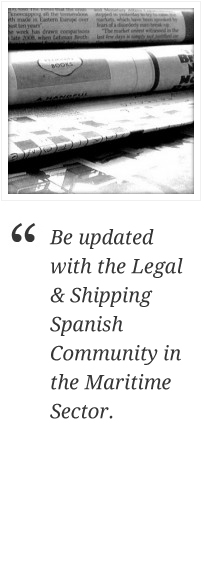November: CIRCULAR 4A/2005
TO SHIPOWNERS / LINES CALLING TO SPANISH PORTS:
SPANISH PORT TARIFFS: UNDUE REVENUES FROM YEARS 1993 TO 2000 AS RECENTLY ESTABLISHED BY OUR CONSTITUTIONAL COURT.
In our Circular 7A/2001 of February we informed that there had been changes in legislation as the Spanish Government had published Law 14/2000 (Ley 14/2000, de 29 de diciembre, de Medidas Fiscales, Administrativas y del Orden Social), which came into force on 1st January 2001, where the Government had until the 1st of April 2001 to present before the Parliament a law draft modifying the regime of the port tariffs established in the 1992 Ports Law in order to contemplate tariff liberty.
The T-3 port tariff was a price that the different Port Authorities applied for the different port services they offered regarding cargo, and regarding cargo and passengers. The Spanish Government ruled this port tariff through Ministerial Orders and decided what port services it should include (access to port, discharge, handling, storage etc.).
Whilst the Spanish Ports and Merchant Marine Law 27/1992 established that the port tariff was a private price regulated by the Transport Ministry -therefore without rank condition of law-, established and approved by each Port Authority, who would then in turn invoice it to the debtor party (the shipowner / charterer / operator through the ship agent), the Spanish Appeal Courts had decided from 1998 to 2000 that these prices (T-3) directly paid by shipowners / operators through their shipagents, and indirectly paid by cargo owners, should be considered null, and the amount paid should be returned by the Port Authorities to the Shipowner. The Courts understood that these prices were really a public price or tax and that they should therefore needed to be ruled by law, and not via Ministerial Order.
The new regulation 14/2000 had been approved to give a stronger control over the port tariffs while a new regulation was being built by the Government. It also provided a control in relation to the payment of the T-3 tariffs as it tried to avoid the execution of the decisions established by the various Courts: a) The Port Authorities having to return the amount of the T-3 already paid by the claimant Shipowner / Charterer, and b) The future non-payment of the T-3 tariff under the allegation that the Courts had decided they were null.
Following those judicial decisions from the Appeal Courts, our Constitutional Court has ruled two Judgements in April and May this year that declare null and against our Constitution the relevant article of Spanish Ports and Merchant Marine Law 27/1992 establishing that the port tariff is a private price that will be regulated by the Transport Ministry. This means that the port tariffs regulation was against our legal compilation. The press and various Law Firms are inviting Shipowners and Operators to claim against the Port Authorities the return of the amounts encashed as port tariff T-3 from years 1993 to 2000.
The reality is that it can not be denied that the port service, independently of the lawful nature of same, was really rendered. Whilst some Shipowners / Operators may try not to pay these services and / or request the return of the revenues, and may succeed, it should be noted that the Port Authorities have means to defend themselves. In the first place they can compensate credits notifying a new settlement, which is an existing legal proceeding. They can also pretend prescription.
Meanwhile, and bearing in mind that Spanish ports are obliged by law to follow the principle of self-financing and therefore receive no financial aid from the General State Budget, Spanish Ports may have to decide to increase the existing taxes to enface the return of the amounts.
Shipowners / Operators should be very careful before starting any proceedings against the Port Authorities, bearing in mind the costs involved and the means with which the Port Authorities can defend themselves, and should seek very clear legal advise before taking any decisions.

